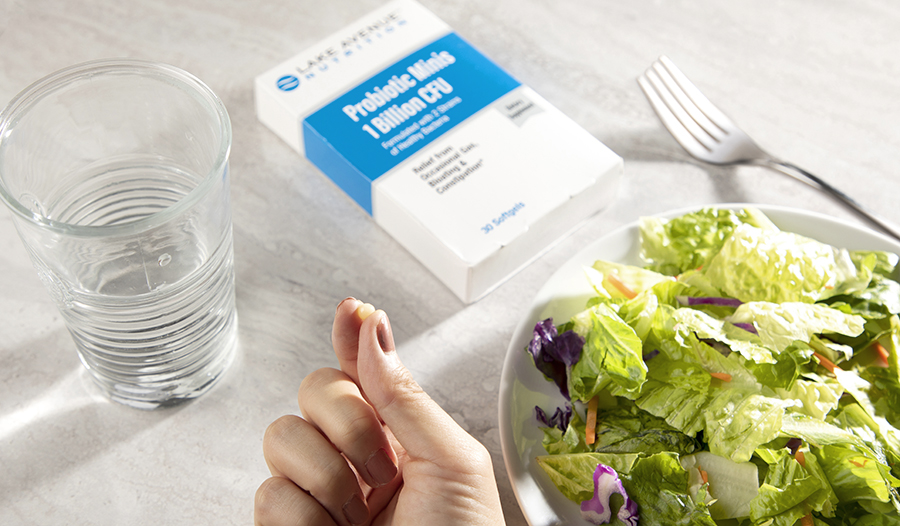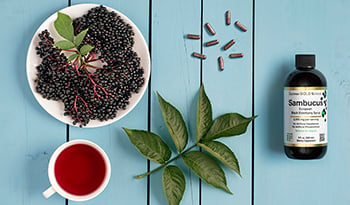Should You Take Probiotics? Popularity, Foods, Immune Benefits, & More

Our immune systems are extremely complex with many factors that determine how well they function to fight off pathogens of all kinds. From nutrition to proper sleep and beyond, taking care of our overall health is extremely important to have strong immunity.
Probiotics are good bacteria that have been proven to be an important factor in staying healthy.
Why Are Probiotics so Popular?
Traditional and indigenous cultures use many fermented products that encourage a healthy bacterial balance or microbiome.
As research discovered that some bacteria were pathogenic, or caused disease, it was thought that all bacteria should be eradicated. Antibiotics are undoubtedly a very important medical treatment that has saved many lives. However, they are often used too frequently to the detriment of our delicately balanced microbiome.
The last few decades have seen more focused research on good and bad bacteria, and which good ones we can use to maintain our health. Probiotics are good bacteria that are a key part of our gut microbiome. Now, there is a paradigm shift in medicine toward a proper balance of bacteria that are an extremely important part of our lives.
What Foods Are Good Sources of Probiotics?
Most of the time we think of probiotics as a supplement to take in pill form; however, they are in many healthy foods, and there are several ways to get probiotics into our bodies. Fresh, whole, unprocessed foods often contain beneficial bacteria without any special preparation.
Kombucha is a trendy fermented tea drink you can find at grocery stores or make at home with a starter culture. You can also take kombucha probiotics in a capsule.
Other common probiotic foods include yogurt, apple cider vinegar (ACV), natto, miso, tempeh, and kefir. It can be easy to make your own fermented probiotic products with yogurt starters, kefir starters, or sourdough starters.
Fermented cabbage is a popular item in many cultures, known as sauerkraut or kimchi. No starter is necessary to make sauerkraut, and it’s easy!
Homemade Sauerkraut Recipe
Ingredients:
- 1 Fresh cabbage, shredded and core removed
- 1 ½ - 2 tsp salt per pound of fresh shredded cabbage
Instructions:
- Mix salt and cabbage in a large bowl and massage for a few minutes until it makes its own juice.
- Put in a glass jar with all cabbage submerged in juice, using a weight if necessary.
- Store at room temperature in a sealed glass jar for 1-4 weeks, then refrigerate. Enjoy a few tablespoons per day on a salad or by itself!
What are Prebiotics?
Prebiotics are food for probiotics and are usually fiber from plant foods that is indigestible to humans. You can take prebiotics as a fiber supplement, or simply eat a diet full of healthy fiber.
What are the Benefits of Probiotics for the Immune System?
Probiotics have become a popular and effective therapy to support the function of the immune system.
The intestines play a large part in our immune systems, which is why gut health is so important for our general health and immunity. Poor diversity in the ecosystems that are our microbiomes can be the cause of not only digestive disease, but skin issues, frequent colds, autoimmune disease, and other chronic and acute infections.
The common term for an unhealthy microbiome is dysbiosis. The composition of our intestinal flora changes over time and depending on our diets and geographical location. Fungal infections can also be a result of dysbiosis. Probiotic supplementation has been associated with overall good health maintenance.
6 Health Benefits of Probiotics
Digestive Issues
A 2012 meta-analysis found that probiotics can be helpful for a wide range of gastrointestinal infections and disorders. Probiotics help the functioning of the intestinal lining, which may enhance the ability to fight off infections that cause unpleasant digestive symptoms. There are many different strains of probiotics, and more research is needed to determine which strains, dosage, and frequency are best to combat each type of infection of microbiome dysfunction. Different types of probiotics may also work differently in different people.
Acute Seasonal Illness
Many studies in people of all ages have found that there may be a link between probiotic supplementation and minimizing the chances of seasonal colds, seasonal influenza, and other seasonal respiratory acute illness. People of all ages who take probiotics need fewer antibiotic prescriptions and miss fewer days of work or school.
Autoimmune Disease
It has been proposed that the rise of antibiotic use is related to the rise of many kinds of autoimmune diseases. Randomized controlled trials have found that probiotics may help ease discomfort associated with rheumatologic autoimmune diseases and autoimmune digestive disorders.
A 2019 review of research found there may be an important beneficial link to probiotic supplementation and improved outcomes in the disease trajectory of systemic lupus erythematosus (SLE). Gut dysbiosis in SLE patients has been correlated to poorer outcomes, particularly when there were low levels of Lactobacillus and Bifidobacterium species. The article focused on rat research and made a lot of theoretical connections, but probiotic supplementation may help maintain a healthy heart and kidneys in patients with SLE. More research is needed to confirm this conclusion.
A 2018 article reviewed the research linking various autoimmune diseases, particularly autoimmune thyroiditis, to intestinal dysbiosis. A comprehensive look at improving intestinal health may benefit those with autoimmune thyroiditis. Seek out a licensed naturopathic doctor to help with an individualized plan for your overall wellness.
Women’s Health
Frequent vaginal infections have been linked to an improper balance of bacteria in the vaginal tract, particularly low levels of Lactobacillus. Lactobacillus rhamnosus and Lactobacillus reuteri are two particular types of bacteria that have been found to have beneficial effects on both bladder and vaginal health. These good bacteria prevent both the bad bacteria and pathogenic fungi from causing disease by inhibiting their adhesion to the mucosa, or the lining of the vaginal tract.
Multiple studies in recent decades have examined the use of probiotics as a treatment in addition to antibiotics for women who experience frequent or recurrent urinary tract infections (UTI), one of the most common acute infections in adult women. This is especially the case in women who have taken frequent antibiotics. Talk to a licensed naturopathic doctor about improving your microbiota.
Skin Health
Taking oral probiotics or using topical probiotic products may help skin conditions that are related to intestinal health or autoimmune disease. Allergic skin conditions can be related to intestinal disturbances of the microbiome, which can lead to food intolerances and digestive problems. Consult with a licensed naturopathic doctor or registered dietitian for help with discovering individualized food intolerances.
Acute Infections in Children
A 2016 systematic review of randomized controlled trials, which included 23 trials involving 6,269 children, found that probiotic supplementation significantly decreases the incidence of children from newborns to age 18 having at least one respiratory tract infection per year.
A 2019 review of randomized controlled trials found that probiotics may help children avoid acute ear infections, as well as minimize the risk of needing antibiotics for any kind of infection. Adverse events in these studies are minimal. However, the optimal dose, strain, and frequency of probiotic supplementation need further study to better advise treatment.
A different 2019 review found that probiotic supplementation in children is associated with a reduced need for prescription antibiotics for acute gastrointestinal infections, ear infections, and respiratory infections.
What is the Importance of the Microbiome?
Our microbiomes are extremely important for immunity as well as overall health. You can reinforce your microbiome with food such as fermented cabbage, kombucha, yogurt, and kefir. Probiotic supplements are generally safe but talk to your doctor about the right kind for you. If you have an infection, an antibiotic used properly is often the best way to get better fast. A licensed naturopathic doctor can help you balance the proper use of antibiotics while protecting your microbiome.
References:
- Bae JY, Kim JI, Park S, et al. Effects of Lactobacillus plantarum and Leuconostoc mesenteroides probiotics on human seasonal and avian influenza viruses. J Microbiol Biotechnol. 2018;28(6):893-901. doi:10.4014/jmb.1804.04001
- Canche-Pool EB, Cortez-Gómez R, Flores-Mejía R, et al. Probiotics and autoimmunity: an evolutionary perspective. Med Hypotheses. 2008;70(3):657-660. doi:10.1016/j.mehy.2007.07.008
- de la Visitación N, Robles-Vera I, Toral M, Duarte J. Protective effects of probiotic consumption in cardiovascular disease in systemic lupus erythematosus. Nutrients. 2019;11(11):2676. Published 2019 Nov 5. doi:10.3390/nu11112676
- Falagas ME, Betsi GI, Tokas T, Athanasiou S. Probiotics for prevention of recurrent urinary tract infections in women: a review of the evidence from microbiological and clinical studies. Drugs. 2006;66(9):1253-1261. doi:10.2165/00003495-200666090-00007
- Gareau MG, Sherman PM, Walker WA. Probiotics and the gut microbiota in intestinal health and disease. Nat Rev Gastroenterol Hepatol. 2010;7(9):503-514. doi:10.1038/nrgastro.2010.117
- Giannoni E, Baud D, Agri VD, Gibson GR, Reid G. Probiotics and COVID-19. Lancet Gastroenterol Hepatol. 2020;5(8):720-721. doi:10.1016/S2468-1253(20)30195-3
- Gupta V, Nag D, Garg P. Recurrent urinary tract infections in women: How promising is the use of probiotics?. Indian J Med Microbiol. 2017;35(3):347-354. doi:10.4103/ijmm.IJMM_16_292
- Hao Q, Dong BR, Wu T. Probiotics for preventing acute upper respiratory tract infections. Cochrane Database Syst Rev. 2015;(2):CD006895. Published 2015 Feb 3. doi:10.1002/14651858.CD006895.pub3
- King S, Tancredi D, Lenoir-Wijnkoop I, et al. Does probiotic consumption reduce antibiotic utilization for common acute infections? A systematic review and meta-analysis. Eur J Public Health. 2019;29(3):494-499. doi:10.1093/eurpub/cky185
- Krutmann J. Pre- and probiotics for human skin. Clin Plast Surg. 2012;39(1):59-64. doi:10.1016/j.cps.2011.09.009
- Liu Y, Alookaran JJ, Rhoads JM. Probiotics in autoimmune and inflammatory disorders. Nutrients. 2018;10(10):1537. Published 2018 Oct 18. doi:10.3390/nu10101537
- Reid G. The development of probiotics for women's health. Can J Microbiol. 2017;63(4):269-277. doi:10.1139/cjm-2016-0733
- Ritchie ML, Romanuk TN. A meta-analysis of probiotic efficacy for gastrointestinal diseases. PLoS One. 2012;7(4):e34938. doi:10.1371/journal.pone.0034938
- Scott AM, Clark J, Julien B, et al. Probiotics for preventing acute otitis media in children. Cochrane Database Syst Rev. 2019;6(6):CD012941. Published 2019 Jun 18. doi:10.1002/14651858.CD012941.pub2
- Virili C, Fallahi P, Antonelli A, Benvenga S, Centanni M. Gut microbiota and Hashimoto's thyroiditis. Rev Endocr Metab Disord. 2018;19(4):293-300. doi:10.1007/s11154-018-9467-y
- Wang Y, Li X, Ge T, et al. Probiotics for prevention and treatment of respiratory tract infections in children: A systematic review and meta-analysis of randomized controlled trials. Medicine (Baltimore). 2016;95(31):e4509. doi:10.1097/MD.0000000000004509
DISCLAIMER:This Wellness Hub does not intend to provide diagnosis...
















































































 Table of Contents
Table of Contents
















